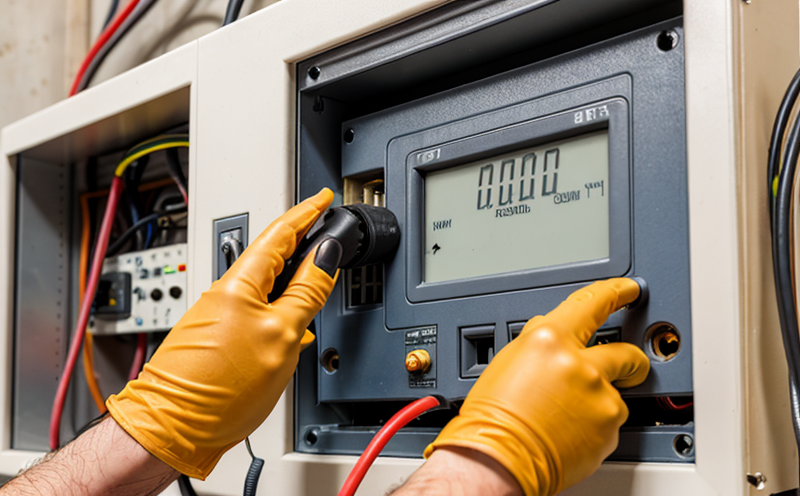DIN EN 62620 Functional Testing of Large Format Secondary Lithium Cells
The DIN EN 62620 standard is a pivotal document for the functional testing of large format secondary lithium cells. This standard ensures that these cells meet stringent safety, performance, and durability requirements before they enter the market or undergo further processing. The scope of this test includes evaluating the electrical characteristics, thermal stability, mechanical integrity, and overall functionality of large format lithium cells used in high-energy applications such as electric vehicles (EVs), energy storage systems (ESS), and aerospace.
Testing according to DIN EN 62620 is mandatory for compliance with international regulations governing battery safety. This includes the UN Recommendations on the Transport of Dangerous Goods and the European Union's Battery Directive. The test encompasses a series of functional checks, including but not limited to charge-discharge cycles, over-temperature testing, short-circuit protection evaluation, and impedance measurement. These tests are critical in verifying that the cells perform reliably under real-world conditions.
Large format lithium cells present unique challenges due to their size and power density. The high energy content requires thorough evaluation of safety features such as internal thermal management systems and over-current protection circuits. The test protocol ensures that these cells can withstand harsh operating environments without compromising performance or risking a fire or explosion.
The functional testing outlined in DIN EN 62620 is not merely a formality; it represents the first line of defense against potential hazards associated with lithium-ion batteries. By adhering to this standard, manufacturers and suppliers ensure that their products are safe for use in demanding applications where reliability and safety are paramount.
For quality managers and compliance officers, ensuring that large format cells meet DIN EN 62620 is crucial for avoiding recalls and product liability issues. R&D engineers benefit from this testing by gaining insights into the performance limits of their designs. For procurement teams, the test results provide assurance that they are sourcing reliable components.
The standard's technical requirements are detailed in ISO/IEC 17025-accredited laboratories, ensuring consistent and accurate results. The laboratory uses state-of-the-art equipment to simulate real-world conditions, providing precise data on cell performance. This comprehensive testing helps identify potential issues early in the development process, reducing development time and costs.
Compliance with DIN EN 62620 also facilitates market access for manufacturers by ensuring their products meet international standards. This is particularly important given the growing demand for electric vehicles and energy storage systems. By adhering to this standard, companies can ensure their products are not only safe but also perform optimally under various operating conditions.
Testing according to DIN EN 62620 involves a series of rigorous procedures designed to evaluate the cell's ability to withstand both normal and extreme operating conditions. These tests include:
- Charge-discharge cycles
- Over-temperature testing
- Short-circuit protection evaluation
- Impedance measurement
- Internal resistance analysis
- Load cycling
- Voltage and current monitoring under various conditions
The test results are detailed in a comprehensive report that includes all relevant data, graphs, and charts. This information is invaluable for manufacturers and suppliers looking to improve their products and processes.
In conclusion, testing according to DIN EN 62620 is essential for ensuring the safety, performance, and reliability of large format secondary lithium cells used in high-energy applications. By adhering to this standard, manufacturers can avoid potential hazards, ensure compliance with international regulations, and gain a competitive edge in the market.
Why It Matters
The safety and performance of large format secondary lithium cells are critical factors that impact various aspects of modern technology. These cells power electric vehicles (EVs), energy storage systems (ESS), and other high-energy applications, making their reliability and safety paramount.
Electric vehicles rely on these cells for efficient operation, extending driving ranges without compromising safety. The performance and longevity of the vehicle depend significantly on the quality of the cells used. A single malfunction can lead to significant downtime or even accidents, highlighting the importance of rigorous testing.
Energy storage systems are crucial for grid stability and renewable energy integration. Cells in these systems must operate reliably under varying conditions, including extreme temperatures and high power demands. Ensuring that they meet DIN EN 62620 standards guarantees their performance and safety, contributing to a more resilient and sustainable energy infrastructure.
The aerospace industry also benefits from the stringent testing of large format cells. Space missions require components that can withstand harsh environments without failure. The functional tests ensure that these cells are reliable under extreme conditions, enhancing mission success rates and crew safety.
By adhering to DIN EN 62620, manufacturers can demonstrate their commitment to quality and safety, which is essential for gaining market trust and regulatory approval. This standard sets a benchmark for excellence in the design and production of high-energy cells, ensuring that they meet the highest international standards.
Why Choose This Test
The functional testing according to DIN EN 62620 is indispensable for manufacturers looking to ensure the safety and performance of large format secondary lithium cells. The test offers several advantages:
- Enhanced Safety: By simulating real-world conditions, this testing ensures that cells can withstand over-temperature situations, short-circuiting, and other potential hazards.
- Improved Reliability: Comprehensive charge-discharge cycles and load cycling tests provide insights into the cell's durability and performance under various operating conditions.
- Regulatory Compliance: Meeting DIN EN 62620 standards ensures compliance with international regulations, facilitating market access and reducing potential legal risks.
- Competitive Edge: Demonstrating adherence to this standard can enhance a company's reputation and attract more customers by showcasing commitment to quality and safety.
- Early Issue Detection: The rigorous testing allows for the early identification of design flaws or manufacturing issues, enabling timely corrective actions.
- Data-Driven Decision Making: Detailed test reports provide manufacturers with valuable insights into cell performance, guiding future product improvements and development strategies.
The laboratory's expertise in conducting DIN EN 62620 testing ensures that the process is accurate, reliable, and consistent. This commitment to quality enhances the overall safety and performance of large format secondary lithium cells.





